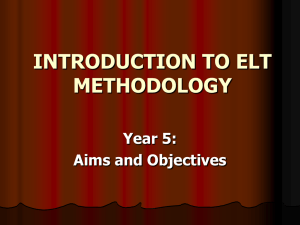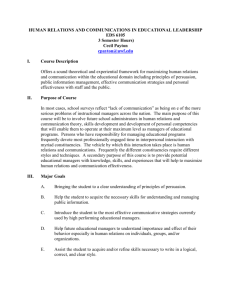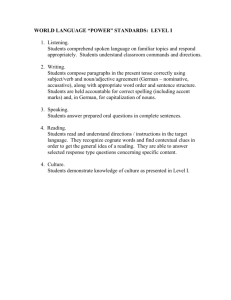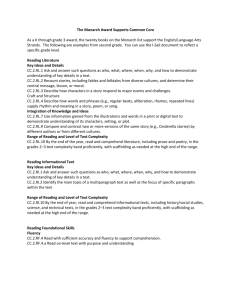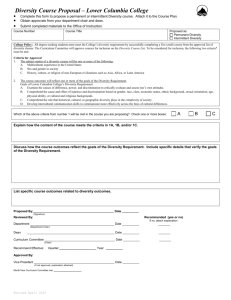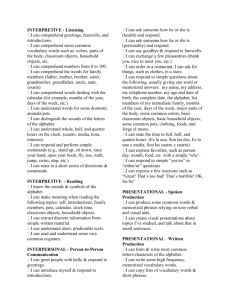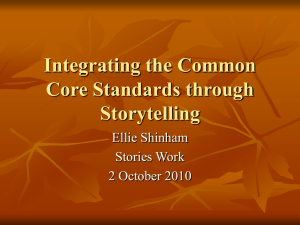Program / Course Goals & Core Abilities
advertisement
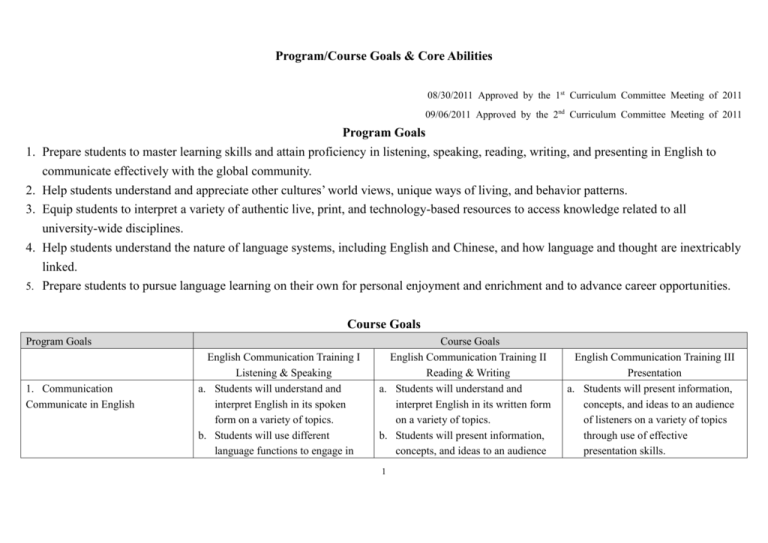
Program/Course Goals & Core Abilities 08/30/2011 Approved by the 1st Curriculum Committee Meeting of 2011 09/06/2011 Approved by the 2nd Curriculum Committee Meeting of 2011 1. 2. 3. 4. 5. Program Goals Prepare students to master learning skills and attain proficiency in listening, speaking, reading, writing, and presenting in English to communicate effectively with the global community. Help students understand and appreciate other cultures’ world views, unique ways of living, and behavior patterns. Equip students to interpret a variety of authentic live, print, and technology-based resources to access knowledge related to all university-wide disciplines. Help students understand the nature of language systems, including English and Chinese, and how language and thought are inextricably linked. Prepare students to pursue language learning on their own for personal enjoyment and enrichment and to advance career opportunities. Course Goals Program Goals 1. Communication Communicate in English English Communication Training I Listening & Speaking a. Students will understand and interpret English in its spoken form on a variety of topics. b. Students will use different language functions to engage in Course Goals English Communication Training II Reading & Writing a. Students will understand and interpret English in its written form on a variety of topics. b. Students will present information, concepts, and ideas to an audience 1 English Communication Training III Presentation a. Students will present information, concepts, and ideas to an audience of listeners on a variety of topics through use of effective presentation skills. conversations, provide and obtain information, express feelings and emotions, and exchange opinions in English. of readers on a variety of topics. c. Students will comprehend written texts through use of reading and vocabulary learning skills. Core Abilities of English Communication Training I, II & III Core Abilities of English Communication Training I Course Goals Indicators for English Communication Training I: Listening &Speaking Level B Level C Listening Listening Listening a. Students will comprehend spoken a. Students will comprehend spoken a. Students will comprehend brief spoken language, as expressed by English messages on topics of personal messages on daily-life topics. speakers in both formal and informal interests, preferences, and memorable b. Students will comprehend simple oral settings. experiences. statements using numbers and time. b. Students will comprehend b. Students will comprehend oral c. Students will comprehend the main idea information using simple messages by applying concepts of contained in various types of spoken mathematics, scheduling, weather or numbers, time and weather. messages. climate. c. Students will comprehend main ideas Speaking c. Students will comprehend main ideas and significant details contained in a. Students will exchange basic and significant details contained in various types of spoken messages. information about people, events, and various types of spoken messages. Speaking places. Speaking a. Students will exchange information b. Students will share opinions and a. Students will exchange information on topics of personal interests, preferences about people, events, about past, current, or future events. preferences, and memorable places, and things. b. Students will share ideas about and experiences. personal reactions to various sources, b. Students will exchange and apply including face-to-face interaction and information incorporating numbers, recordings. time and weather. c. Students will describe issues and c. Students will compare and contrast problems that are of concern to opinions and preferences about Level A 1. Communication 2 others. d. Students will exchange, support, and discuss opinions on various topics dealing with personal, contemporary, or historical issues. people, events, places, and things. Core Abilities of English Communication Training II Course Goals 1. Communication Indicators for English Communication Training II: Reading & Writing Level A Level B Level C Reading Reading Reading a. Students will acquire knowledge and a. Student will acquire knowledge and a. Students will understand highly new information from extended new information from comprehensive contextualized texts of familiar topics. discourses. texts. b. Students will comprehend the main b. Students will comprehend main ideas b. Students will comprehend the main ideas of selected written materials. and key supporting ideas, and make ideas and supporting ideas of selected Writing inferences in selected written written materials. c. Students will compose sentences to materials. Writing state opinions and personal preferences Writing c. Students will compose paragraphs to about people, events, places, and things. c. Students will compose essays to compare and contrast opinions and d. Students will compose sentences to compare and contrast opinions and preferences about people, events, exchange basic information about preferences about people, events, places, and things. people, events, and places. places and things. d. Students will compose paragraphs to d. Students will compose essays to express feelings, emotions and describe and discuss issues and opinions in various situations, and problems that are of concern to respond appropriately to the feelings others. and opinions expressed by others. Core Abilities of English Communication Training III Indicators for English Communication Training III: Presentation Course Goals Level A Level B 3 Level C 1. Communication a. Students will apply and present a. Students will present information, a. Students will present information, information, concepts, and ideas to a concepts, and ideas to a peer/teacher concepts, and ideas to a peer/teacher peer/teacher audience of listeners on a audience of listeners on a variety of audience of listeners on a variety of topics variety of topics ranging from mottoes topics ranging from mottoes for life to ranging from favorite places to for life to current affairs in the news. current affairs in the news memorable experiences. b. Students will develop and apply tactics b. Students will develop the basic skills b. Students will recognize, comprehend and & skills acquired in units which include required for a basic presentation which apply on a basic level brainstorming, tips brainstorming, taking and using includes brainstorming, taking and for basic introductions, and presentation presentation notes, explaining survey using presentation notes, explaining layout including organization, data/information, and persuasive use of survey data/information, and persuasive preparation, and making a formal public English in formal public presentations. use of English in formal public presentation c. Students will talk critically about daily presentations. c. Students will talk about daily activities, activities, plans, likes and dislikes, and c. Students will talk critically about daily plans, likes and dislikes, and past past experiences and respond activities, plans, likes and dislikes, and experiences and incorporate these into appropriately to those of others. past experiences. Students will basic presentations. Students will incorporate basic incorporate basic social/cultural social/cultural knowledge and current knowledge and current affairs into oral affairs into class discussion and oral presentations. presentations. 2. Culture a. Students will be exposed to the target culture in areas ranging from daily activities to entertainment. b. Students will discuss events/culture from all over the globe and will be able to relate and critically reflect upon knowledge and experiences related to the target culture. 4 3. Connections a. Student will be exposed to general information in their peers’ various disciplines through interaction in class. b. Students will improve English presentations in their own disciplines. 4. Comparisons a. Students will gain insight into English and Chinese through comparing things like feelings and experiences to peers and English speakers. b. Students will become more familiarized with the target culture through sharing and discussion opinions and viewpoints with peers and English speakers. 5. Communities a. Students will discuss various topics in the context of an English-speaking environment with their peers and instructors within and beyond the school setting. *The courses mainly focus on communication, and therefore the sections in gray (culture, connections, comparisons, and communities) are optional. *The above curriculum plan is developed based on National Standards for Foreign Language Education, issued by ACTFL (American Council on the Teaching of Foreign Languages. 5
